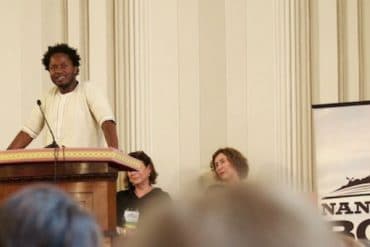How Jason Reynolds turned a childhood love of hip-hop into becoming a rock star writer.
When Jason Reynolds walked into Nantucket High School this past April, he was greeted like a rock star. The New York Times best-selling writer and Nantucket Book Foundation Visiting Author has reached countless young readers through raw, lyrical storytelling that transcends background and unites students around universal themes of growing up in the 21st century. “Doesn’t matter if they are black kids in Harlem or white kids on Nantucket,” Reynolds says. “Everybody knows what fear feels like, what loneliness feels like, knows the insecurities of trying to fit in. Those are the things that are universal.” Ten years ago, Reynolds was scrambling to make a life. Today, of all the stars in the literary universe that are lighting up skies for children, Reynolds is his own constellation.
 Growing up on the urban streets outside of Washington, D.C., Reynolds hit a rough patch at the age of ten when his family split up. He found refuge through an affinity for words—not reading exactly, but the words that came at him through rapper Queen Latifah. “Rap music saved my life,” he says. Rappers “looked like us, walked like us, told stories like us.” The power of poetry put to music became Reynolds’ armor and he started writing his own “Queen Latifah poems” based on experiences in his life.
Growing up on the urban streets outside of Washington, D.C., Reynolds hit a rough patch at the age of ten when his family split up. He found refuge through an affinity for words—not reading exactly, but the words that came at him through rapper Queen Latifah. “Rap music saved my life,” he says. Rappers “looked like us, walked like us, told stories like us.” The power of poetry put to music became Reynolds’ armor and he started writing his own “Queen Latifah poems” based on experiences in his life.
His other saving grace was his mother who taught him that “the only thing that can’t be taken from you is your education.” The problem was that when Reynolds set off for college, he still hadn’t read a single book in his life. He did not connect with books because he could not connect with their subject matter. “Can’t be what you can’t see,” he said. “Judy Blume wasn’t coming to the hood; Dr. Seuss didn’t come to the hood. Read this book about this man chasing a whale!? Nah. I never met no whale before. I ain’t readin’ this.” Richard Wright’s Black Boy became the first book he identified with, where the “kid sets the curtains on fire and burns the house down.” Reynolds realized that he didn’t hate reading; he hated being bored. That revelation inspired a writing career that has since turned countless kids on to reading.
Reynolds began turning the “Queen Latifah poems” of his youth into stories for the youth. The story of who his brother became after losing an eye and a military career in a fight he still won’t talk about became When I Was the Greatest. So many funerals burying so many friends became The Boy in the Black Suit. The pain, rage and anger over the murder of a friend became Long Way Down. Reynolds’ books hold powerful threads of inspiration and hope. How a single moment can change the trajectory of life, how a single person can change your life.
 Reynolds unique style and growing popularity has propelled him outside of literary circles and into the seats of late-night television shows and the subject of nightly newscasts. He’s gradually emerging as a cultural icon emblematic of the new face of writing. And yet despite his growing fame, Reynolds continues to try to get in front of as many young students as possible, not just through his books, but in person.
Reynolds unique style and growing popularity has propelled him outside of literary circles and into the seats of late-night television shows and the subject of nightly newscasts. He’s gradually emerging as a cultural icon emblematic of the new face of writing. And yet despite his growing fame, Reynolds continues to try to get in front of as many young students as possible, not just through his books, but in person.
That was what brought him onto Nantucket this past April. He wants students to see that “though he may live what seems to be an extraordinary life, he’s a super ordinary guy who has built this life for himself through literature and through literacy.” Growing up, Reynolds never knew he could make a living as a writer. Now, he wants to be an example for children. “There’s something to that,” he says. “To tear down some of the mysticism of being an artist or of being a person who works in this world. You can do this, too.”
 “Excellence is a habit,” he told the students gathered at the auditorium at Nantucket High School. “You make hard decisions every day. Make excellence who you are.” He added, “The very thing that makes them mad is what makes you magic.” Write what’s real, he told them. “The greatest gift you can give yourself is yourself,” he said. “Wish somebody had told me that.”
“Excellence is a habit,” he told the students gathered at the auditorium at Nantucket High School. “You make hard decisions every day. Make excellence who you are.” He added, “The very thing that makes them mad is what makes you magic.” Write what’s real, he told them. “The greatest gift you can give yourself is yourself,” he said. “Wish somebody had told me that.”







